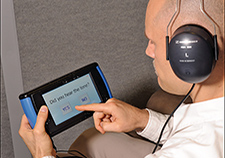Office of Research & Development |
 |

VA Research Currents archive
December 8, 2014

Cody Goheen, a Navy Veteran who served in the Gulf War and today works as a research coordinator at the Portland VA, demonstrates the OtoID.
When cancer strikes, doctors do what they can to save lives. Chemotherapy drugs are potent weapons against cancer cells, but they can have serious and permanent side effects. One of them is hearing loss.
Researchers at the VA Portland Health Care System have developed technology to help prevent this side effect. They call it the OtoID, and so far the system has been tested with the help of 110 volunteers, with promising results.
The technology itself doesn't treat the hearing loss caused by some chemotherapy drugs, but it enables patients to easily and reliably test their own hearing, so the first signs of damage can be caught early on.
In most cases, doctors will be able to adjust the dose of the drug, or perhaps use a different one.
"Our experience with [the oncology department] is that treatment regimens are changed, or less toxic drugs are substituted, when ototoxicity [toxic damage to the ear] is found and tumor response to the treatment has been good. This means that it is medically reasonable to change the regimen," says researcher Dr. Marilyn Dille. She says colleagues are now doing a formal study of how many patients have had their treatment plan changed thanks to the OtoID.
Dille and the project's other lead investigators, Drs. Peter Jacobs and Dawn Konrad-Martin, are all with the Portland-based National Center for Rehabilitative Auditory Research. The center is funded by VA Rehabilitation Research and Development.
Right now, the team plans to have the device deployed mainly on chemotherapy wards, so cancer patients can get a pre-treatment baseline measure of their hearing and follow-up periodically to check for changes. The plan is for the OtoID to eventually be used by Veterans and others at home, as well.
The system, which runs off a tablet such as an iPad, allows test results to be transmitted back to a VA clinic via a secure wireless network. Audiology staff can then enter those results into patients' electronic health records, for sharing with oncologists and other care team members.
The most common chemo drug linked to permanent hearing loss is cisplatin. The platinum-based drug is used to treat head, neck, and lung cancers, as well as other tumors.
Up to half of Veterans who receive the treatment will incur some permanent hearing loss, and up to 40 percent will experience tinnitus—ringing or other noises in the ear that can become highly distressing and debilitating.
Dille says that as cancer survival rates improve, health care providers are increasingly focusing on quality of life—both during treatment and afterward. That means easing side effects, both temporary and permanent, is more of a priority than in the past.
"Health-related quality of life is now a central goal of cancer treatment," she points out. "This patient-centered approach to oncological care is one reason why methods to reduce and manage ototoxicity are receiving increased attention."
First and foremost, the OtoID tests high-frequency hearing. That's the range where chemo-related damage typically occurs. Users listen to tones via headphones and use a touchscreen to indicate which tones they hear.
The latest version of the OtoID, now in the works, also tests low-level sounds produced within the inner ear, the cochlea, as it turns incoming sound into signals for the brain.
Testing these "otoacoustic emissions" can be done even while a patient sleeps. Dille says it's a good indicator of hearing changes, especially when patients' overall poor health prevents them from reliably completing standard tests.
VA oncologists recommend that chemotherapy patients be monitored for hearing loss, but it often doesn't happen. "Feedback from VA audiologists indicates that this is infrequently done, largely due to logistics relating to testing patients, and limited access to evidence-based, time-efficient tools and protocols," notes Dille. "The OtoID was developed to directly address these obstacles."
Asked if the technology might become obsolete if a new generation of less toxic chemo drugs emerges, Dille suggests there is likely to be a continuing need, even with improvements in care.
"Cancer treatment is always advancing," she acknowledges. "Certainly less toxic drugs would be an outstanding improvement. We hope that happens." But a more near-term development, she says, will likely be drugs designed to be given along with existing chemotherapy agents to prevent, lessen, or reverse the ear damage they cause.
"The OtoID will certainly be relevant for testing the efficacy of these pharmaceutical approaches, and for other uses, such as hearing conservation programs that monitor the hearing of workers and soldiers in excessively loud noise or explosion," says Dille. Her group recently provided the Department of Defense with two OtoID devices for this purpose.
With the help of VA's Technology Transfer office, the OtoID has a patent application in the works, and commercial partners are being sought to license and manufacture the system.